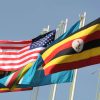Columnists
Mandela’s place is assured in history
The death of Nelson Mandela has provoked an outpouring of mourning, celebration, and commentary around the world that is unprecedented for an African leader. Glowing tributes have gushed from world leaders and major magazines and newspapers have carried special features on his extraordinary life and legacy.
He has been showered with lavish praise as a great man, titan, colossus and conscience of his nation and the world for his magnanimity, moral courage, and dignity; for his resilience, patience, and passion; for his charisma, charm, regal countenance and common touch; for his humility, visionary and political brilliance; and above all, for his spirit of forgiveness and reconciliation, believed to be the driving force behind the South African “miracle” that steered the beloved country from the abyss of a racial bloodbath.
Many have remarked on Mandela’s remarkable understanding of the nature of politics and the performance of power that enabled him to embody the nation better than many of his fellow founding fathers of African nations and his two successors. Above all, he is praised for his lack of bitterness after spending 27 years in jail and his embrace of forgiveness and reconciliation.
The manner in which this issue is discussed often serves to advance the redemptive narrative of Mandela’s road to political sainthood. Only he and his closest confidants of course know how he truly felt. Post-apartheid reconciliation may or may not have been a romantic attribute of Mandela the man; it was certainly a pragmatic imperative for Mandela the nationalist leader.
Mandela’s life and legacy cannot be fully understood through the psychologizing and symbolic discourses preferred in the popular media and hagiographies. It could be argued that he and his comrades were able to sublimate their personal anger and bitterness because the lib
eration struggle was too complex, too costly, too demanding, too protracted, and too important to do otherwise. Reconciliation was both a tactic and a necessity because of the dynamics of the liberation struggle in South Africa.
Mandela was born in 1918, a mere eight years after the founding of South Africa as a nation out of four separate settler colonies and an assortment of conquered African states and societies, and six years after the formation of the African National Congress. He was thirty when the country’s racist settler regime gave way to the uncompromising racial barbarity of apartheid in 1948. In the early 1940s he was one of the founders of the ANC Youth League in the early 1940s that sought to radicalize and rescue the ANC from its reformist politics.
When the ANC adopted the Program of Action in response to the establishment of apartheid, he became the leader of the Defiance Campaign in the early 1950s. In 1955 he was among 156 activists who were tried in one of the largest political trials in South African history that lasted from 1956 to 1961. Following the Sharpeville Massacre in March 1960, the liberation movement decided to shift to armed struggle and Mandela was charged with the formation of the ANC’s Unkotho we Swize (Spear of the Nation).
In 1963 Mandela and nine other leaders including Walter Sisulu, his mentor, and Govan Mbeki, the father of future President Thabo Mbeki, were charged with sabotage at the infamous Rivonia Trial. During the trial, on April 20, 1964, Mandela uttered his immortal words from the dock: “I have fought against white domination and I have fought against black domination. I have cherished the ideal of a democratic and free society in which all persons live together in harmony and with equal opportunities.
It is an ideal I hope to live for and to achieve. But if needs be, it is an ideal for which I am prepared to die.” Thus Mandela was not an advocate of Gandhi’s or King’s non-violent resistance, not because he was not a man of peace, but because he correctly understood that in the South African context, fighting against an obdurate racist settler regime required all available tactics from mass protest to armed resistance. For him multiple tactics had to serve the overall strategy of achieving national liberation. In short, as a freedom fighter he was simultaneously a political leader and a guerrilla leader. Under the ANC’s broad and tolerant political umbrella he worked with traditionalists, liberals, socialists, communists, and Black Consciousness activists, both before and after his long incarceration.
Mandela’s example shines all the brighter when compared to his nemesis in Zimbabwe, Robert Mugabe, once a widely admired liberation hero who remains president 33 years after independence. Mugabe together with the likes of President Yoweri Museveni of Uganda now in power for 27 years, the same number of years Mandela spent in apartheid jails, and still going, represent the dinosaurs of African politics in a continent that has been undergoing various forms of democratic renewal since the turn of the 1990s, in part influenced by the demonstration effect of South Africa’s transition to democracy and Mandela’s enlightened exit from office after only five years.
This article heavily draws from the works of Paul TiyambeZeleza, Vice President of Academic Affairs and Professor of History, Quinnipiac University, Connecticut, USA.
Comments













